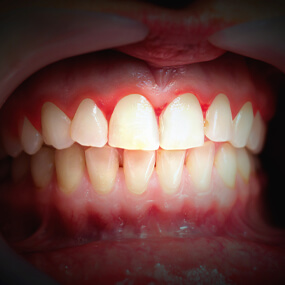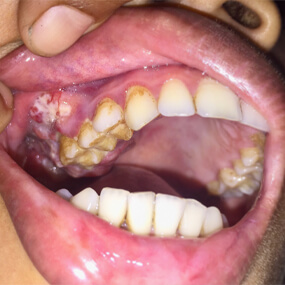How Dental Implants Protect Your Natural Facial Shape

People who have lost teeth often wear that loss on their faces. Their faces can seem caved in. There can be deep wrinkles around the mouth and pouches at the corners of their smiles, and the nose and chin may seem unnaturally close together. Such features often indicate that not only are teeth missing, but the roots are as well. A root not only anchors its tooth to your jaw, but it stimulates the jawbone when you chew, which is important to maintaining the jaw and thus preserving your facial structure.
There are multiple dental solutions to replace missing teeth, including bridges and dentures, but a dental implant is particularly effective because it mimics the natural tooth root. A titanium post is inserted into the jaw. It serves the role of the root and stimulates the jaw when you chew. It also provides the foundation for a restoration, such as a crown. Since the jaw continues to be stimulated as it naturally would, it retains its mass and thus helps to maintain the natural facial structure.
Each Tooth Has a Role to Play
Each tooth has various jobs to perform based on its position and shape. Some are meant for tearing and others for chewing, and all teeth help to maintain the stability of the teeth beside them. If you lose a tooth and do not replace it, the jawbone in that area will gradually break down. This can lead to facial collapse and additional tooth loss. Another potential problem is that nearby teeth now have to perform the role of the missing tooth. This can create a great deal of wear and tear on the remaining teeth.
Negative Outcomes Associated With Missing Teeth
Good oral health is only possible when each tooth is present, performing its role, and supporting its adjacent teeth. One lost tooth can cause a domino effect that leads to further tooth loss and other health issues throughout the mouth. As this cycle of bone loss continues, facial features will change, and the face will become less symmetrical overall. Teeth can shift, which can lead to malocclusion—a bad bite—but also temporal mandibular joint (TMJ) pain, muscle spasms, and other issues. TMJ issues are often the result of joint inflammation, which can occur due to the incorrect working of the jaw. Teeth shifting is not limited to side to side. A missing molar, for instance, can cause the front teeth to splay outward, another kind of bad bite, which can also alter the facial structure and lead to discomfort.
How You Should Proceed With Missing Teeth
The worst outcomes will not occur overnight. That said, the longer you wait, the more you run the risk of damage that will cost even more to correct. Therefore, you should schedule a visit with your dentist as soon as possible. Your dentist will explore your options, help you choose the ideal corrective path for you, and ensure that you avoid bone loss, facial collapse, and other oral health issues.
Protect Your Smile and Facial Structure
If you are missing one or more teeth, Jeffrey D. Clark, DDS, encourages you to schedule an appointment with him as soon as you can. Dr. Clark can replace the tooth and help you avoid the negative side effects, such as a bad or painful bite, TMJ discomfort, facial collapse, and further loss of teeth. Dental implants are usually the optimal solution in these cases, and Dr. Clark works with Dr. Joe Mehranfar, one of the leading dental implantologists in the Greater Scottsdale area. At Scottsdale Cosmetic Dentistry Excellence, you will also have access to all of the preventative care you need to ensure that you never lose a tooth again or for the first time. Call us at 480 585 1853 to learn more about our dental services and to schedule an appointment.




